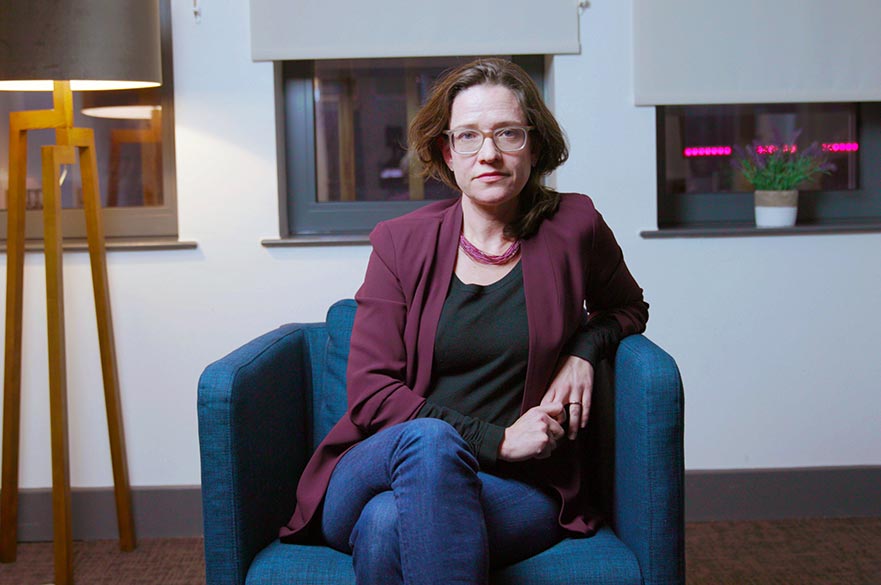Clothes that save lives: developing advanced wearable technology
Yang Wei, Associate Professor
I develop wearable tech to detect and diagnose medical conditions. Through my work, I want to improve people's quality of life, prompt independent living and ease pressure on the NHS
My research journey
I have had a passion for researching things I don't understand since my childhood. One of my hobbies is model making, and to achieve a high level of realism, I have always immersed myself in research on materials, suitable paint colours, and airbrushing techniques. It all began when my dad introduced me to model assembly - we often worked together on these projects, sometimes even until midnight, much to my mum's annoyance! To help me improve my skills, he started with affordable model kits for me to practice with before moving on to more expensive ones. He never hesitated to fulfil my requests for new models, and I consider myself incredibly fortunate to have had such unwavering support for my passion and hobby. I believe he understood that this was the best way to nurture my enthusiasm.
I developed a fascination for mechanical engineering and military equipment from my grandfather, who served in the military. Together with my passion for model making, these interests led me to pursue a degree in Electronic Engineering at the University of Central Lancashire, which I successfully completed in 2008.
Upon graduation, I faced a decision regarding my academic path: whether to pursue a PhD at the same university or explore a master's degree elsewhere. Feeling unprepared for a PhD at that point, I opted for a master's degree. It was during this time, while studying Microelectronics at the University of Southampton, that a turning point came in my final year. I accidentally chose to work on "printed electroluminescent lamps on textile" as my final project, even though I didn't initially understand the term "electroluminescence." Nevertheless, I was intrigued by the prospect of working with lighting technology. Successfully completing this project opened up many opportunities for me. I was fortunate to be offered a funded PhD opportunity through an EU-funded project called MICROFLEX, where I worked on the development of various functional materials that have since been commercialised. Following the completion of this, I was involved in another EU-funded project called CREATIF, which focused on an innovative printing technique for smart textiles in the creative industry. During this project, I had the privilege of collaborating with talented individuals, including the world-renowned architect, Zaha Hadid.
Following years of extensive general research in smart textiles, I found myself at a crossroads, unsure of which direction to take my research in – the creative, flexible electronics, or medical devices industry. Speaking with my father, who works in a medical device company specialising in rehabilitation aids, proved to be the turning point. He suggested that I utilise my expertise in wearable tech to advance medical devices and positively impact people's lives, making them live for longer and happier.
I listened to my father's advice and transitioned into the healthcare sector, where I now focus on researching and creating wearable medical textiles, specifically those that enable early detection, diagnosis, and treatment of health conditions and diseases. My research areas encompass sensors, actuators, communications, additive manufacturing, and smart materials.
Helping people to live well independently
Working in the healthcare field, my goal is to improve people's lives and promote independence. Medical devices that aid in achieving these objectives are of utmost importance to enhance well-being and alleviate the burden on healthcare systems like the NHS. A significant challenge lies in making wearable devices less intrusive and more durable while maintaining comfort and performance. To address this, I am dedicated to enhancing technologies through innovative materials and manufacturing processes.
In 2018, I was granted a project focused on developing wearable technology for the treatment of DVT (deep vein thrombosis). During this project, I stumbled upon an unexpected discovery - the wearable device showed significant improvements in treating lymphedema, a chronic condition affecting various parts of the body. This newfound revelation immediately sparked my interest, as it directly related to a condition that my grandma was experiencing. The potential to positively impact a broader range of people, including my grandmother, motivated me to pursue further research in this area. I was excited by the prospect of making a difference.
Building on this exciting finding, I delved deeper into the study. As a result of my efforts, in 2021, I was honoured to be awarded another major project by the Engineering and Physical Sciences Research Council (EPSRC). This project allows me to continue advancing this innovative technology in collaboration with world experts and industry partners, furthering its potential to benefit countless individuals.
For all its positives, the acceptance of wearable devices presents another challenge, requiring active involvement from healthcare providers in aspects such as procurement, budgeting, and policymaking. In the coming decade, I hope that smart clothing can integrate into everyday clothing, acting as a guardian to protect, alter, or intervene when necessary.
The essence of my research lies in enabling invisible and non-invasive monitoring and treatment of patients, empowering them to control their treatments and substantially improve their quality of life.
Follow my story
My story doesn’t end here. Keep up to date with me and my research by keeping an eye on my academic profile or following me on Twitter @DrYangWei. For anything else, please feel free to email me.
Yang Wei
Dr Wei is an Associate Professor in Department of Engineering at Nottingham Trent University and the lead of Smart Wearable Research Group which focuses on the development of innovative wearable solutions.
Meet our researchers
Forget lab coats and research papers. It's time to get personal. Meet the people behind the research and uncover fascinating truths about their experiences.


